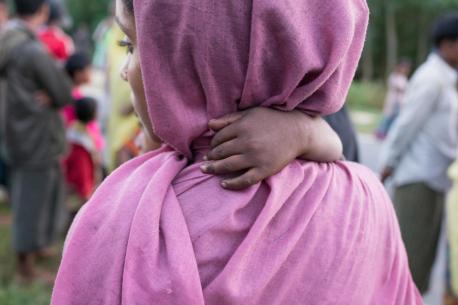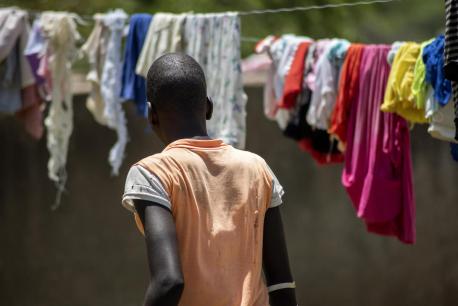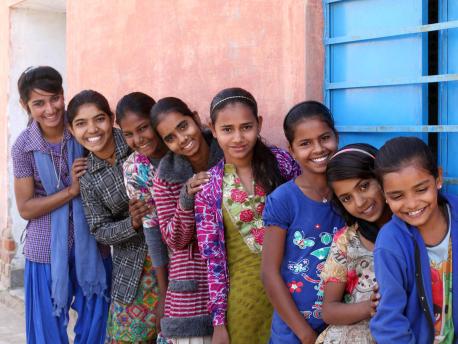
Rohingya Face Higher Risk of Gender-Based Violence During Lockdown
In Bangladesh, UNICEF is working to make sure vulnerable women and girls can still get the support they need, despite the isolation of COVID-19 containment measures. Shumi, case manager: "We are still here."
The nationwide lockdown in Bangladesh wasn’t enough to keep the virus out. And then on May 14, the first case of COVID-19 was confirmed inside the refugee camps in Cox’s Bazar, home to nearly 900,000 Rohingya — stoking fears of a rapid spread through the densely populated settlements and surrounding neighborhoods.
UNICEF and other UN agencies have stepped up assistance efforts in the refugee camps and host communities, setting up health facilities for isolating and treating patients and shoring up water and sanitation systems. Early on in the crisis, UNICEF and partners installed handwashing stations and launched an emergency information campaign to communicate risks of the disease and benefits of certain response measures like sheltering in place.
For some, sheltering in place to stay safe from disease increases risks of gender-based violence
But for many Rohingya and Bangladeshi women and girls, staying inside and out of sight brings another kind of danger: an increased risk of gender-based violence, including intimate partner violence and sexual exploitation.

Shumi, the manager of a UNICEF-supported Safe Space for Women and Girls in Cox's Bazar, Bangladesh, continues to support those at risk of gender-based violence during the COVID-19 pandemic lockdown, even though her center is shuttered. © UNICEF/UNI319802/Jean
Gender-based violence (GBV), one of the most pervasive yet least visible human rights violation in the world, often surges in a crisis, as deprivations mount, stress piles on and social support systems fracture. The current pandemic is no different, experts warn — even as the reporting of such incidents declines in some places.
The problem is that the perpetrator is often a member of the victim's own family, a close friend or neighbor. For Rohingya refugees and others with limited means of reaching out for help — no mobile phone, no privacy — the situation can seem even more helpless, explains Shumi, a manager of a UNICEF-supported Safe Space for Women and Girls in one of the Cox's Bazar camps.
UNICEF services for vulnerable women and girls are still available — even during lockdown
Before the pandemic, there were 15 Safe Space centers in the district providing group counseling and other services for victims and survivors of gender-based violence, trafficking, child marriage and other harmful practices. With Bangladesh in lockdown, these centers have had to temporarily close their doors, and suspend all group activities.
But support services for individuals — new and existing survivors of gender-based violence — are still available, notes Gertrude Mubiru, a UNICEF Gender-Based Violence Specialist.
Informational home visits can provide a lifeline for those in need
Volunteers are making regular house visits to share information about how to prevent the spread of COVID-19, while respecting physical distancing guidelines. These interactions provide an opportunity to spread the word about the other support services that are available — and how to access them — including services for survivors of GBV. There are case workers still on the job and available to help individual women and girls in need.
“People are afraid because they fear services and care will stop," Shumi says, "but we are still here."

Before COVID-19 forced a nationwide lockdown in Bangladesh, young students at a UNICEF-supported learning center at the Kutupalong refugee camp in the Cox's Bazar district could stand side by side to wash their hands. Women and girls are often the hidden victims of a crisis like the current pandemic, as the risks of gender-based violence increase and support services become more difficult to access. © UNICEF/UNI315490/Himu
Help UNICEF and partners continue working to support vulnerable women and girls everywhere. Your contribution can make a difference.
Top photo: A Rohingya refugee and her baby photographed on the shores of Bangladesh in August 2017, shortly after crossing by boat from Myanmar to escape genocidal violence. UNICEF and partner agencies are warning that Rohingya women and girls, among other vulnerable groups, face a higher risk of gender-based violence during the pandemic lockdown. © UNICEF/UN0156977/Bindra
HOW TO HELP
There are many ways to make a difference
War, famine, poverty, natural disasters — threats to the world's children keep coming. But UNICEF won't stop working to keep children healthy and safe.
UNICEF works in over 190 countries and territories — more places than any other children's organization. UNICEF has the world's largest humanitarian warehouse and, when disaster strikes, can get supplies almost anywhere within 72 hours. Constantly innovating, always advocating for a better world for children, UNICEF works to ensure that every child can grow up healthy, educated, protected and respected.
Would you like to help give all children the opportunity to reach their full potential? There are many ways to get involved.




